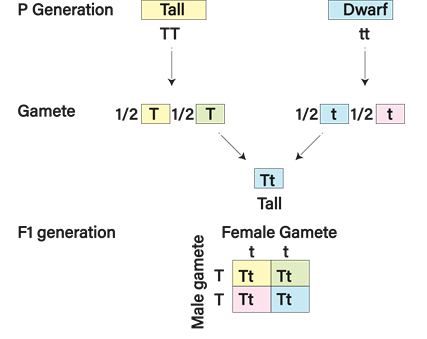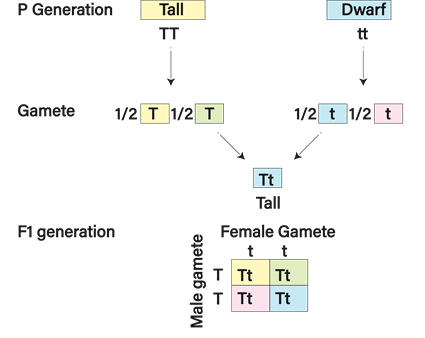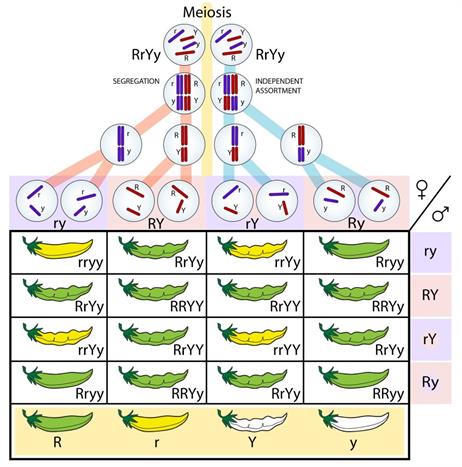
PUMPA - SMART LEARNING
எங்கள் ஆசிரியர்களுடன் 1-ஆன்-1 ஆலோசனை நேரத்தைப் பெறுங்கள். டாப்பர் ஆவதற்கு நாங்கள் பயிற்சி அளிப்போம்
Book Free DemoMendel postulated three essential rules based on his monohybrid and dihybrid cross studies, now known as Mendel's Laws of Heredity.
The three laws of heredity proposed by Mendel are:
- Law of dominance
- Law of segregation or Law of purity of gametes
- Law of independent assortment
1. Law of dominance:
"When two homozygous individuals with one or more sets of contrasting characters are crossed, the characters that emerge in the F1 hybrid are dominant, while the ones that do not present in the F1 hybrid are recessive."
Consider a homozygous pea plant with a tall character (TT) and another homozygous pea plant with a dwarf (tt) character.
Each organism comprises a collection of characters, is controlled by a pair of factors or genes (T or t). Each of the paired factors (Tt) is responsible for the expression of a specific variety (tall and dwarf) of a character (height). According to Mendel's law of dominance, one factor in a pair can mask or prevent the expression of the other. He called the varieties that appeared in his monohybrid crosses F1 generation dominant and those that did not appear in the F1 generation recessive.
Even though dwarf genes are present in (F1) generation plants, they are not expressed, referred to as masked or recessive characters. In the absence of its dominant allele (T), a recessive allele (t) freely expresses itself. This law of dominance is formulated based on the monohybrid experiment.
If both the pure-bred pea plants (TT and tt) are fertilised, then in the F1 generation, we will find all plants are tall.
\text{TT (Parent 1)} + \text{tt (Parent 2)} \xrightarrow{\small{\text{}}} \text{Tt (Progeny)}

Mendel's law of dominance
2. Law of segregation or Law of purity of gametes:
"An F1 hybrid is created when two contrasting factors are combined. When gametes are created, the two components of the allelic pair stay together without mixing, and only one penetrates each gamete."
Each organism is made up of a collection of traits. A pair of genes control each character. When two genes of a specific character are inside the organism, they are uncontaminated. The paired genes segregate and enter different gametes during gamete formation. As a result, each gamete contains only one of the paired genes responsible for a specific trait.
The Law of segregation is formulated based on the monohybrid experiment.
Example:
The paired factors (Tt) present in the plant segregate independently and enter different gametes during gamete formation in the F1 hybrid tall plant. So, from the paired factors Tt, which are responsible for expressing a single character, each gamete receives either T or t.
Parent generation: Tall (T) and Dwarf (t)
Gametes: T (or) t
F1 generation: Tt (Tall)

Law of segregation
3. Law of independent assortment:
"When two or more pairs of characters are inherited at the same time, the factors or genes of one pair sort out independently of the other pair."
The Law of independent assortment is formulated based on the dihybrid experiment.
During dihybrid cross gamete formation, the yellow colour factors assort independently of the factors for round shape. The gene Y may combine with the other character's dominant gene R or recessive gene r\ to form a gamete. Similarly, the gene y can combine with the dominant gene R or the recessive gene r to form a gamete. As a result, the F1 dihybrid plants produce four types of gametes: YR, Yr, yR, and yr.
Parent generation: YYRR and yyrr
Gametes: YR and yr
F1 generation: YR, Yr, yR, and yr.

Independent assortment & segregation
Reference:
https://commons.wikimedia.org/wiki/File:14_05LawOfSegregation_2_L.jpg
https://upload.wikimedia.org/wikipedia/commons/8/8b/Independent_assortment_%26_segregation.svg
https://www.shutterstock.com/image-illustration/mendel-law-segregation-independent-assortment-1580399281
https://www.shutterstock.com/image-vector/mendel-genetic-concept-mendelian-genetics-pea-1462778021